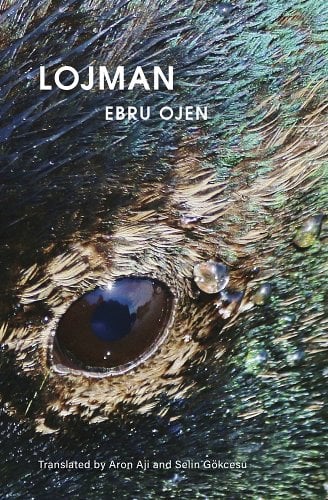
The last days of January. The village, poised to withstand another month of violent storms, was a dark, iron-colored cloud settled among the mountains and hills. The villagers carried cowpats and wood from barns to homes, baked bread in pit ovens, fed the animals, and visited each other from time to time. The footpaths, the water canals, the poplar trees surrounding the plains alongside the dirt road that led to the asphalt, all were covered in ice, the soil had frozen through, Lake Van was covered in a thick layer of fog.
In the vastness of that scene, the lojman seemed smaller and smaller, squeezed into a ball, like a grenade that could explode at any moment.
Yasin was watching the smoke that rose from the lojman’s chimney against the background of pure white snow. The Erciş Plateau stretched out before him. His random thoughts idled around fleeting topics, and his mind, unable to focus on anything else, honed in on the teacher’s house. He wanted to know what went on inside that concrete dwelling, what Selma did throughout the day, how she walked around in the living room, the kitchen, down the hallway, how she treated her children. Selma’s instability seemed more pronounced to him since Metin’s departure. The children had looked neglected when he saw them last. He didn’t even want to ask how the newborn was doing. Once or twice he had thought of congratulating Selma, but had been discouraged by her stern look that suggested quite clearly that there was nothing worth congratulating.
After a long trek, he reached the lojman. His heart sank at the sight of the abandoned school building. The dire conditions of the winter and Metin’s absence had subdued the boisterous schoolyard. His own children were stuck at home, unable to go to school or play outside. The storm surges, the bone-chilling cold had made it difficult for children to play outdoors. They had to stay healthy. He wouldn’t be able to bring them to the doctor. The nearest township clinic was hours away. God forbid, they could die on the way there. He pursed his lips. What could he do but pray for the winter to end soon? A heartfelt sigh escaped his nostrils.
He saw that the flag had again wrapped itself around the pole. It barely moved. He felt nervous and had to fix it. Hurrying his steps, he thought this could be a good excuse to talk to Selma, and maybe to see the children.
Holding onto the icy pole, he tugged on the cord. Because the flag had frozen around the pole, freeing it wasn’t as easy as he had hoped. Soon enough, Yasin, who infused everything he did with traces of his stubborn nature, fixed the flag and watched it flutter against the sky. Taking confident steps, he walked up to the front door, but by the time he had tapped on it twice, he felt uneasy again. Görkem with her red curly hair opened the door. She was wearing only an undershirt. Yasin took a step back and, averting his eyes from the half-naked girl, asked whether Selma was home. Indifferent, Görkem called out “Selmaaa.” While waiting for her mother to arrive, she didn’t neglect to smile at Yasin, succeeding in finally bringing a warm smile to his face. Just when the lines upon the uninvited guest’s face had started to relax, Selma appeared behind her daughter. Startled, Yasin forgot about using the flag as an excuse and blurted, “Any news of our teacher?”
Selma thought she saw a hint of death in Yasin’s face and flinched. Fixing him in an icy stare, she said, “No, he is not back yet.” A prolonged silence followed.
Yasin was wary of this woman who didn’t speak much, who was reserved not just toward him, but even toward her own children. Until now, Selma had been open only with Songül, his wife, but even that openness was tentative. Every so often, when Songül fired up the pit oven or when she headed to the mountainside to gather herbs, Selma would join her. Hours later, when Yasin asked “What did you two talk about?” a terse, repressed, mocking “Nothing” would escape Songül’s lips. And it was true that they didn’t talk about anything of substance. Selma was the type of stingy friend who shared little of her thoughts, emotions, or intentions.
Yasin never understood how Metin could tolerate her strange personality. He couldn’t make sense of how she never cooked, how she left her children’s care to her husband, how she idled about most of the time. Take, for instance, her bizarre attitude toward the superintendents who had come to check on the school. At the end of their visit, they had expected to rest awhile, but Selma had neither made tea for her guests nor even smiled at them. She just sat on the chair she had placed next to the front door, took regular drags on her hand-rolled cigarette, and kept muttering, her displeasure clearly written on her face.
The superintendents, feeling more than spurned, had initiated an investigation against Metin as soon as they left the village. In truth, her behavior had secretly delighted Yasin. What she did was a rebuttal to the officials’ self-satisfied, condescending attitude. Selma had dismissed them the way she dismissed everyone.
Dismiss the shadows, if we want. What of it?
Resistance is useless now.
She was poised for a long journey, one with no turning back. A dark, irresistible landscape awaited her. Once she took the first step, everything would change. A short stretch at first, then a little longer, and a little longer. . . . She had never felt she belonged to this place, and she would never return. She put on her coat, wrapped a scarf around her neck, and tied her boots. She could see no one in the direction of the snow-covered plains. She wanted to walk the icy road all the way to Erciş. With every step, she savored the poems in her mind, the looming presence of Mount Süphan. She recited to herself the small clusters of verse that came rolling in.
I saw you for the last time
Asleep, curled up in your crib, hurt . . .
She wandered aimlessly along the shore. The small, dark cavities of her footsteps in the snow advanced within the expanding silence. She should never return to her children, to the gray house, just vanish into the blue expanse of the lake.
Her hands clasped over her stomach, she listened to her surroundings, filling her ears with the wind, the indistinct voices of the villagers, the sounds of winter animals, leafless trees.
I have tasted so little of the world, she thought. She wanted to walk out upon the lake and disappear into the horizon, where her field of vision ended, somewhere over the plains. She was trapped in a melancholy so powerful that it was clear she could not remain on the shore much longer.
Completely worn out, she slipped her hands in her pockets and turned her back to the lake. The lojman loomed larger than before. She resented knowing that she would return to the grayness that beckoned her, that promised her safety. Against her will, she began running toward the house, unable to restrain her obstinate feet. Like a snail torn from its shell, she was bewildered when she couldn’t feel the house over her body. She couldn’t resist rejoining the gluey, mucous coilwork. The slime that enveloped her insisted on its demands. Total submission, blindness, enslavement . . . She was someone who repented every time but sinned again at the first instance of weakness. She pitied herself. She was a pathetic coward. As she reached the front door, nothing was visible except the smoke rising from the village chimneys and the endless icy blue. In that vast landscape, she was a scrap of newsprint on a collage. Not of that setting, yet part of it just the same.
Far from the village, the asphalt road leading to Erciş looked like a white, living reptile that stretched into nothingness. Her hands, her face were beet red. She hadn’t realized how exhausted she was by the cold until she arrived at the door. In her eyes, on her face, there were no hints of discontent nor concern for her children. She had forgotten everything as she hurried toward the lojman. Once there, she rested her head gently against the outer wall, slowly coming back to reality. She closed her eyes, her ears perked up. She heard sobs that sounded almost like someone was choking. She didn’t want to know or hear what was happening, or that the sobbing belonged to her baby who had been hungry for some time. She wanted to rest against the wall a little longer, to keep her eyes closed, to just breathe. A familiar sensation took hold of her, pulling her in. When she felt it reach even the whites of her eyes, she closed her mouth shut.
Now she could hear Görkem’s and Murat’s voices blending with the baby’s crying. Her eyes burned. A few teardrops ran down her cheeks. Her chin trembled, she couldn’t stop the pounding of her heart. The hot tears multiplied, trickling down her cheeks to her chin, then to her chest. She was floating upon a pool of tears like a drop of oil. She needed to believe that she hadn’t gone mad, that she wasn’t contriving excuses to evade motherhood. She was afraid, afraid of her children, of her baby who didn’t even have a name, of the way it was always hungry. The voices grew louder. They leaked from the lojman’s walls and wrapped around her throat, they seeped under her skin, into her blood. She was being poisoned, she was dying, her children were doing to her what winter did to the lake.
She had to put an end to the torture, she had to bash her head against the wall until she felt nothing.
Harder, more violently . . . She bowed her head, touched it with her fingers. A lump had formed on the side of her forehead within seconds. There was no blood, not even a scratch. Only a little lump had emerged; her anguish had turned into a comic protrusion on her head.
__________________________________
From Lojman. Copyright © 2020 by Ebru Ojen. Translations copyright © by Aron Aji and Selin Gökcesu. Reprinted with permission by City Lights Books. www.citylights.com


